
Interview with Steven L. Sears
July 2005Bitch of Rome: What episode of Xena are you most proud of?
SS: Which one of your children are you the most proud of? It's not really a question I can answer. I like them all for various reasons and each one takes the head of the list depending on how I feel at the moment.
BoR: If you could re-write an episode, which would it be and why?
SS: Again, it's not the kind of question I can answer. I'm going to be infuriating in this sense, but there are some questions that I can't answer because I don't think in those terms. Each episode I wrote was rewritten by me many, many times before anyone saw it. The only reason a writer stops re-writing a script is because it's finally been shot on film. Otherwise, writers are always rewriting their scripts.
BoR: When "The Quill is Mightier..." aired, you were now credited as a Co-Executive Producer rather than a Supervising Producer. What is the difference between these positions?
SS: The various producer headings vary from show to show as to what their duties are. The Co-Executive producer works more closely with the Executive Producer in day to day business. A Supervising Producer organizes and coordinates the activities of producer under him and reports to the Co-Exec or Exec Producer. That's the basic definition. But, as I said, it varies from show to show. On Xena, it was more of a recognition of work I had already been doing, so the actually work I did didn't change that much. Most people don't know that I actually started on the show as a Creative Consultant. But I took the more hands-on Supervising Producer position before we started to air the episodes as a result of the previous Supervising Producer leaving the series.
BoR: "Dreamworker" and "The Greater Good" were some of the best episodes of season one, and even of the series as a whole. What led to the ideas behind these episodes?
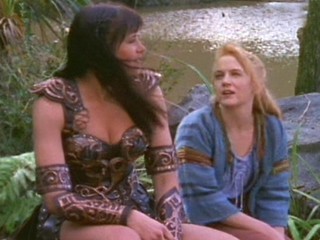
SS: "Dreamworker" started as the result of a question. Literally, a question. And I wasn't even pitching an episode when I asked the question. I had been brought in for the first time to meet RJ, Rob, and everyone else. It wasn't intended as a pitch meeting, it was what is called a "meet 'n greet." They just wanted to get a sense of me and, if they liked me, have me come in later to pitch. During the meeting, I was asking questions about the series. There was no footage at the moment aside from the Hercules footage, only RJ's "Sins of the Past" script. One of my questions dealt with the interaction of the gods. I knew that Zeus and Ares had been used on Hercules (the big, furry Ares, anyway), but I wanted to know whether they were going to use lesser gods or demigods. Rob asked me what I meant. And I said "Well, say that Morpheus, one of the gods of sleep and dreams, decides..." and on the spot, I pitched "Dreamworker." Now, keep in mind, I wasn't pitching. I was making it up on the spot just to illustrate my question. When I finished, Rob said, "That's a great idea" and I think my response was "yeah, yeah, it's great, but answer the question..." Anyway, I came back about a week later and pitched five ideas, one of them being the "Dreamworker" idea. That's the one that Rob wanted to do, so that was it.
As to "Greater Good", I'm not sure how that started. I know I wanted to use Salmoneus. I knew that I wanted to have Xena "die." I think those were the two components that started me thinking about the story. From that, I started to weave it into what I finally wrote. Bits and pieces came in, some were kept, some were thrown out. I do remember two things about the writing, though. First, I remember being told that some people didn't like the title. Thought that "Greater Good" sounded too sappy. But I liked it. And, I was told by at least one person that the "tree bashing" scene wouldn't work, that it didn't make sense. I stuck to that one as well as I hoped Renee would key into it. She did and it's the most memorable scene (for me) in the entire episode.
BoR: Looking at "Dreamworker" and "Hooves and Harlots" what changed from making Gabrielle the non-fighting sidekick, to taking up the staff for the first time?
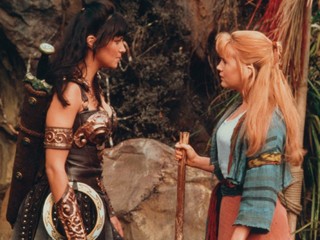
SS: Simple. We started to realize a fatal flaw in the character. When Xena started to kick ass, Gabrielle could only stand in the background going "Get 'em, Xena! Look out, Xena!" That's not a very interesting character and we knew the audience would get tired of that real soon. So I came up with the idea of giving her a weapon so she could participate, but I made sure it was a weapon that was, on the face, defensive. The staff is a weapon where it takes true skill to actually kill someone. By comparison, anyone can kill with a sword. So, in other words, the default of the staff was to defend. It certainly could kill, IF the owner worked at it. This was perfect for Gabrielle. It meant she could participate, but not risk her blood innocence in battle.
BoR: You got the write the first Xena appearance of Autolycus, the first comical character on show. You tended to write the more drama heavy episodes, as compared to this high comedy one. Was that challenging for you?
SS: No, not really. I hadn't really noticed that I had written more drama episodes. In fact, most people who meet me think that I must write comedy. I enjoy writing comedy and, in fact, think of myself more in those terms. My characters usually have some sort of humorous aspect to them.
BoR: You and Chris Manheim created the story for "Remember Nothing" together. How do you decide when two writers work on a script together (as you have done with Manheim and R.J. Stewart) and when to have only one person write the script? How do you decide which writer will write the teleplay once you've decided only one of you will write it?
SS: Actually, Chris and I didn't work on the story together. "Remember Nothing" was a story I had written just after "Dreamworker." It was going to be my next script, but Rob felt it was too early to do that kind of story and wanted me to do something else. So it sat around for a while. Then, we had some sort of time problem and needed a script. I reminded Rob about "Remember Nothing" and he thought it was time to write it. Trouble was, I was already writing a different script at that time so I couldn't do it. So I suggested we give it to Chris. She did an incredible job with it, changing it and making it much better than the original story.
Whether or not two or one writer works on a script can be for many reasons. Usually, it's just the one writer. Sometimes, because of time pressure, you need to roll it off quickly, so more than one writer might work on it. ("The Quest" was originally intended to be a staff written episode, but I ended up doing the final writing on the script). Or sometimes two writers just feel like writing something together. In general, though, I prefer to write on my own.
BoR: "Intimate Stranger" was the first time someone either than Stewart wrote for Callisto. Was it challenging to recreate Stewart's creation, especially when the actresses were switching roles?
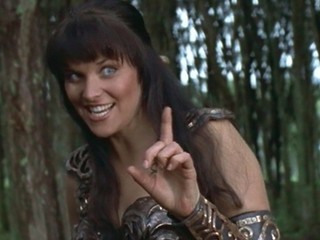
SS: No, not any more difficult than writing any other character that I didn't initially create. And I felt I had a good focus on Callisto. I felt she was a character whose goal of making Xena suffer was based in her hatred and passion. But, eventually, the hatred and passion wasn't as important as the goal itself. In other words, the reasons no longer mattered; it was the joy of the goal that mattered. In that sense, she no longer felt much of anything. But she was still driven to her goal. It was now as much a part of her as her body and soul.
Writing them in each other's body was a challenge but easier than I expected. First thing was that I wrote them just as their characters, regardless of the bodies they were in. Then I reread the script from the perspective of the other characters, to make sure that their reactions were true to the things they were aware of (and not, say, having them react to things that the writer was aware of). I had to constantly shift my perspective to keep everything true to the reality of the script.
BoR: "Destiny" was the first episode that began to explore Xena's back story. How was it decided where to make Xena come from and just how bad she was going to be?
SS: That was straight from Rob. It was his idea to do an episode that explored when and how Xena became evil. RJ and I refined the idea in concert with Rob. We decided that Xena went through a few stages to get where she was when we saw her in Hercules. First, she was the peasant girl. Then, because her village was attacked, she became a warrior, but only defensively. To protect her home, she then assembled an army and asked other villages to join her in a defense pact. Those that did were absorbed into her growing army. Those that didn't soon fell to the philosophy that if you aren't my friend, you're my enemy. Xena made alliances or conquered an ever widening circle of villages in order to create a defensive sphere This is very similar to what the Soviet Union did, by the way. Soon, her quest for security became interchangeable with her quest for power. That was when she ran into Caesar. Her interaction with him was the final straw. She turned from conqueror to the "Destroyer of Nations" (though that name didn't come till later). It all followed a very sensible and psychological progression.
BoR: "The Price" was about internal battles, but also about finding common ground with your enemies. What led to the ideas behind this fabulous script?
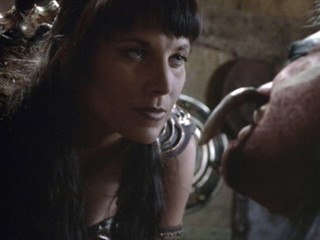
SS: Well, thank you, first of all. The vast majority of that script comes from upbringing as a son of a military man. My father was in the army. He was a sniper in Korea and Special Forces in Vietnam. Since I was a child and was aware of what he did for a living, I was fascinated with what motivates men and women in war. I mean, the same hands that had lovingly tucked me in at night had also killed human beings. Yes, we can rationalize why he did that; it was his job, he was protecting his country. It was sanctioned by our society. But it doesn't change the fact itself. As a result of that, I became fascinated with military history and the sociology behind it. That is what led to "The Price."
The first thing I had to do was to convince the audience that the Horde were worthy of fear. Hard to do when your hero has taken on gods and won. But the answer to that was simple: I just had to show my hero in fear. The fact that Xena chose to run instead of fight was more than enough to convince the viewer that this was a special circumstance and a special enemy.
The next thing I had to do was to show the mindset of the soldier in times of war. We are taught, in our civilian life, that killing another human being is evil. How do you undo that? By dehumanizing the opponent. This has been done time and time again throughout history. The enemy is always less than human, animalistic, barbaric, cruel, not worthy of life. And any sense of uniqueness in their culture was to be interpreted in the most negative of light. Further example of how animalistic they are.
Which is why I wrote the Horde the way I did. I wrote them as "animalistic" in our eyes. I wrote them in such a manner that many people, including Rob, Lucy, Liz and others, felt that I had gone too far and made Xena come off as racist. I did it deliberately because that is exactly what is always done in order to reverse our social engineering and kill another human being (remember the poster of Germans and Japanese during World War II?). I was even accused of being racist by some of the fans. Which means that I succeeded because they all bought the propaganda which proved my point.
Now, to Xena, I had her run "home." Xena was, for the first time we could see, in absolute fear of her life and that of Gabrielle. She immediately went to the programming that had served her so well in the past: warrior Xena. That's "home" for her, it's a part of her that is comfortable and secure. But from her perspective, she was just being logical, using the techniques that had proved successful in the past. The desperation of the garrison played into this from both sides: the willingness of the soldiers to follow her reinforced her feeling and the appearance of a warrior such as Xena gave them hope, they would follow her blindly.
Now into all this... add Gabrielle. A complete outsider to all this. Biased in her own way, but not so quick to believe in the programming she has never had a need for. She couldn't look at the Horde as animals, they were human beings to her. But she was confused by Xena's actions, she had never seen that before, either. Her conflict trying to adjust to all that was where the story was.
Finally, finding the solution for it all. Amazingly simple, when I finally hit on it. It was to simply make Gabrielle assertive about the one thing she could control. Her own death. If she was going to die, she was going to die as who she was: someone who cared about others, regardless of the politics or appearances.
To be honest, when I wrote the script, I didn't expect the amount of response it has received. I felt too much of it was personal to me to be understood or picked up by others. I was wrong. But, never mind, I couldn't have written it any other way.
BoR: Was writing "The Bitter Suite" a challenging experience?
SS: Yes. I'm not sure what else I can write to answer that. Trying to mount a musical was probably the most intense episode we had tried to do. There were so many elements to keep track of and so many people to deal with in the process. Writers like to be on their own when they write, but this was not a script that would allow that. Chris and I had to be in constant contact with each other to make sure our efforts were in synch, and we had to have a sense of the lyricists and the kind of music we wanted. But never mind all that, "Bitter Suite" is a showcase for all the people we had working on the show. Every bit of talent in that episode is right there on the screen. I'm still not sure how we did it, but there it is.
BoR: What led to the decision to have Gabrielle have Crassus executed in "When in Rome..." which was a huge step for her character?
SS: I had always seen Gabrielle's journey as a series of steps in her maturity and experiences. It was time for her to realize that decisions have to be made and some of them involve the lives of others. She had been standing on the sideline too long watching these things happen, it was time for her actually experience it. Life is not simple, choices are not simple. Sometimes the better choice is a bad one, but still the best you can do. That experience was too important to Gabrielle to have just made it an element of an episode. It had to be what the episode was about. So I let Xena leave the major decision of the episode up to Gabrielle. Dropping the ring into the ocean at the end of the episode represented Gabrielle finally letting go of the naiveté of her youth.
BoR: "Between the Lines" allowed you, once again, to be the following writer behind another great Stewart villain. What are your thoughts on Alti and writing for her?
SS: I think Alti was easier than Callisto. I mean, you just have to hear Claire's voice and you get it. Alti was the seeker of power by other means. She could never achieve it on her own, she needed a proxy. Xena. But in "Between the Lines," I had to show a progression of her soul at the end of several generations of karma. I made her more evil as her karma would have degraded her in each generation. In my mind, she had become a black hole with little light or redemption possible.
BoR: You killed Ephiny and Solari. What led to the decision to kill these popular guest characters?
SS: As I remember, Solari was because we couldn't get the actress [Jodie Dorday] for the episode. Ephiny could have been either way. I told Rob that I could wound Ephiny and write the episode that way. He told me that Danielle felt she had gone as far with Ephiny as she could and wanted to kill her off, so that's what I did. As I said, I could have written it either way, but I have to admit, the death of Ephiny added much more to the conflict in our characters.
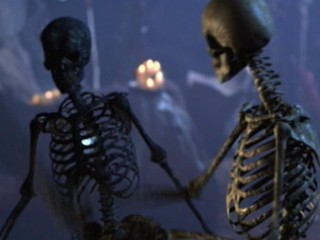
XT: You wrote both "Them Bones, Them Bones" and "Back in the Bottle" under the pseudonym Buddy Williers. Why did you choose to write these episodes under another name, and why this one?
SS: At the time that I wrote those episodes, I was already working on getting Sheena to the screen. Rob and I had agreed that I would leave the show and that Bob and Alex would come in to replace me. At that point, I was no longer a functioning member of the staff. Rob didn't feel (and I didn't either) that it would be right for me to be in the meetings and doing rewrites when developing a show that would be a competitor. So I effectively became a freelance writer. Now understand that any rewrites done on my scripts for Xena were done by me. I can take the criticism and/or compliments on any of them. But once production started, the usual rewrites had to happen on those scripts. But I wasn't going to be doing the rewriting, Bob and Alex were. As a result of that, I felt it was better that I use a pseudonym instead of my own name. It wasn't a quality assessment of the rewrites, it was just that I couldn't defend or accept compliments for writing that wasn't mine. Rob was a little upset at this as, I think, he initially took it as anger from me, but I explained to him that it wasn't.
BoR: What were your thoughts as you wrote your last episode of Xena?
SS: Sad, of course. I had my name on twenty five of those episodes as a writer and all of them as a producer. I knew I couldn't come back to it, I knew that Xena wasn't going to be on much longer. I remember cleaning out my office, sitting in it alone for a while, then taking a photo of it and walking out. It was very sad, but things move on.
BoR: What led to your decision to leave Xena?
SS: I had the opportunity to create my own show. Rob knew that was where I was going and I would have preferred to have done it with Renaissance. But I was never offered that opportunity so when it came from another source with a project I wanted to do, I took it. You'd have to ask Rob about the other side of it. I just take it as a part of the business and move on.
BoR: What are you thoughts on where Xena went after you left and how it ended?
SS: To this day, I have yet to see any of the episodes done after I left. So I can't really give a first person assessment on it. The reason for this is because when I left, I was wrapped up on Sheena and didn't have a chance to look at the episodes. Also, I was trying to purge myself of Xena thinking in order to make the new show its own. When Sheena was over, over two years had elapsed, so just jumping back into watching the series would have been a problem. Let's face it, Xena is the kind of series that doesn't do well with casual viewing. So I never got around to it. I have all the episodes, but just haven't gotten to it. And, I have to admit, I know too much about the series to be able to just sit back and enjoy it for what it is. I'd probably be too critical. I'd be upset at certain choices made and/or I'd be upset that I wasn't a part of certain choices made. So I can't really say what my thoughts about the series are now.
BoR: What do you think about the growth of Gabrielle and where she character went after you left the show?
SS: I was quite pleased with the growth of the character, I think we managed to make her much, much more than just another sidekick. She became a character in her own right because we chose to make her real and take her in a direction that showed growth. But as to where the character went after I left the show, again, same answer as above. I don't know much about it.
BoR: Do you ever regret leaving Xena?
SS: No. I'm not wired that way.

BoR: Who is your favourite Xena character?
SS: That's like asking me what my favourite episode is. Can't give you an answer. It would change from moment to moment. They all have special places in my heart.
BoR: Which character of Xena do you think was the most original idea?
SS: Hmmm...good question. I don't know that I have an answer to that. Every character, just like every plot, has been done before in some way or fashion. That would be a good survey question for fans, I think.
BoR: Who is your favourite character that you have ever created?
SS: Harry O'Fell. You didn't specify Xena. And of Xena, same answer as to any of the "favourite" questions. (Harry O'Fell, by the way, was the lead of an unproduced series I wrote for CBS in 1990).
BoR: Do you think the end of syndicated television has helped or hurt TV?
SS: The end of syndication isn't the point, it's the reasons behind the end of syndication. It all has to do with money. I would require a lot more time than I have to give to explain the system, but syndication no longer exists. For one thing, there is too much in the way of programming out there to allow for it and, for another, the costs have become counterproductive. I can say, though, that for me, syndication was by far the best of the choices. Even though it paid the least, it allowed more freedom and stability for the time it existed. I've worked in network, cable and syndication, and syndication is by far the favourite.
The only thing that "hurts" TV is the audience. Seriously. We all complain about the choices on TV, but it's the audience that makes the choices. There truly is some wonderful TV out there, but it has to compete with lesser shows that have better ratings. And since ratings are (supposedly) a determiner of the viewing habits, we are always in control.
There's a reason why nobody reads the Enquirer and, yet, it has a larger circulation than most major newspapers.
BoR: What's next for you?
SS: Don't know. This business is very, very fickle. I haven't sold another show since Sheena, which isn't surprising. And I am typecast by doing syndication, so it's harder to get work. Believe it or not, there are some executives and producers who won't even read my work once they see Xena on my resume. This isn't whining, by the way, it's just the way it is. So I am keeping busy writing some screenplays. Whether any of them sell or not isn't my focus, although it would be nice. Writing isn't something I choose to do; it's something I have to do. If I had millions of dollars, I'd still write. So I write. I am also producing a documentary on the 50th anniversary of the Fender Stratocaster, but we'll see if that ever gets done. But one thing I've learned in twenty plus years of this business: you just can't tell what's around the corner. I have never been able to predict my next job or kind of show.
As an example: In 1995, I got a call from a friend of mine who was just hired to produce a new series. She said it was called Xena and asked me if I was interested in writing an episode...

